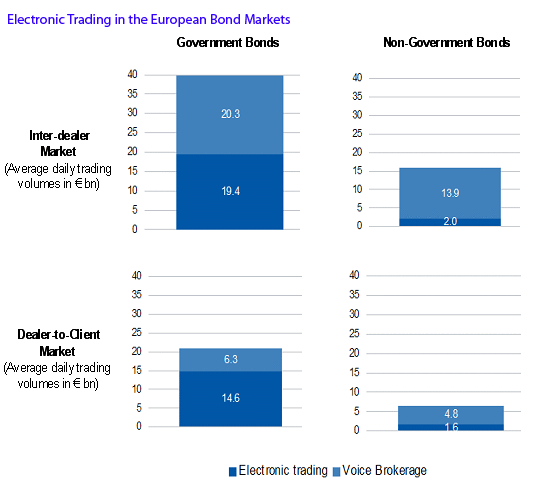Electronic Trading of Bonds in Europe: Weathering the Storm
Abstract
The European fixed income market has grown rapidly in the last few years and has become the largest market, along with the US, in the world. In 2010-2012, there will be a recovery in overall trading volume as well as the level of electronic trading in Europe as the economy improves and spreads tighten.
In a new report, E-Trading of Bonds in Europe: Weathering the Storm, Celent analyzes the state of the European bond markets and the severe impact of the downturn on electronic trading, which reached levels far below those attained earlier in the decade. The report also discusses the various interdealer broker (IDB) and dealer-to-client (D2C) platforms.
The crisis has meant that market participants have been reluctant to invest more in electronic trading. It is believed that the bottom was reached towards the end of 2008 and that volumes have recovered in 2009. At present, government bond volumes are down around 20%-30% from their pre-downturn levels. Non-government bonds have suffered much more, with trading levels down 70% to 80% from their pre-credit crunch levels. However, both have recovered and should return to their predownturn levels in 2010. 
"Different national markets are opening up at differing rates, resulting in a lack of homogeneity in the markets' development," says Anshuman Jaswal, Celent analyst and coauthor of the report. "The UK and Germany have had relatively open markets for some time. In the last few years, countries such as France, Belgium, Austria, and the Netherlands have created a more equal playing field for the various IDB platforms through the removal of the Primary Dealer (PD) platform requirements that have for a long time benefited MTS. However, Italy, Spain, and Greece have been slow to open their markets to international competition."
"The post-trade infrastructure for European fixed income should be revised. The current state of the post-trade infrastructure is a clear barrier to the growth of liquidity. It is noncompetitive and fragmented, and CCP services are only available for transactions conducted electronically," adds Axel Pierron, Senior Vice President at Celent and coauthor of the report. "With more competition, we could see development similar to what we saw in the equity market, where implementation of the Code of Conduct in conjunction with MiFID has driven a significant decrease in post-trading costs, indicating the emergence of truly pan-European clearinghouses such as Euro CCP and EMCF. This evolution would be beneficial to European fixed income market participants and, eventually, to issuers."

